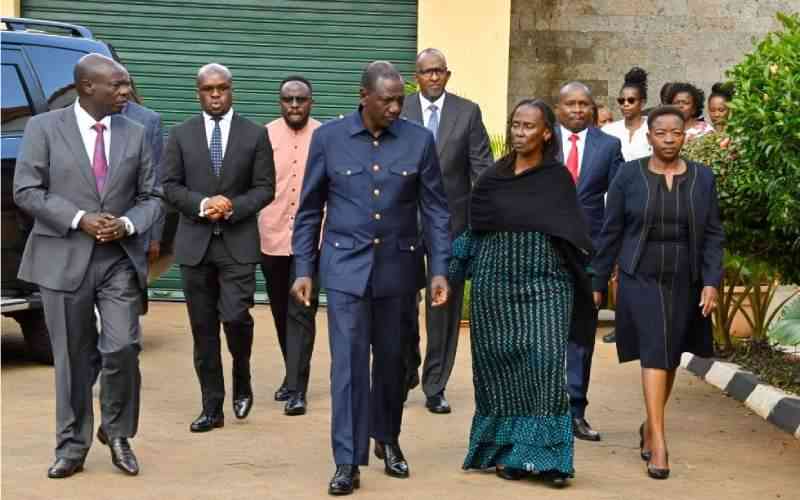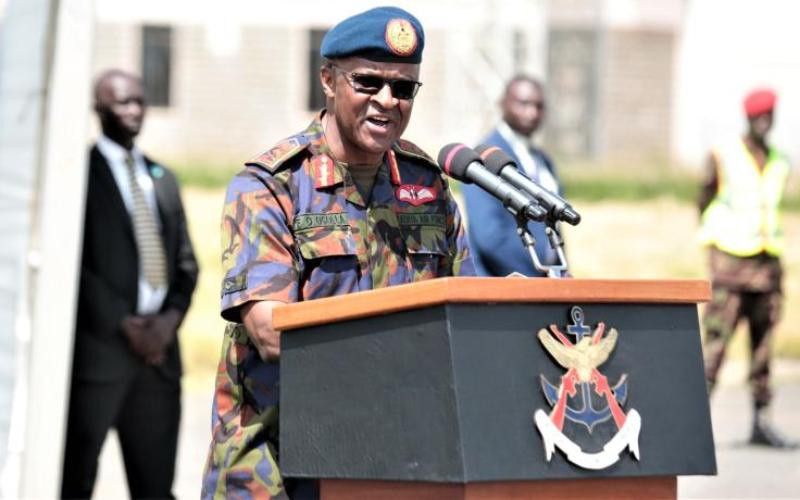By Jacob Ngetich
NAIROBI, KENYA: The “Occupy Parliament Reloaded’’ protests on Tuesday when activists ‘paid MPs a second ‘courtesy call’ to press upon them to drop their salary demands could be a pointer to re-awakening of the once robust civil society.
The legislators have rejected the Sh532,000 monthly salary set by the Salaries and Remuneration Commission (SRC) and insist on the previous Sh821,000, and recently passed a motion to send home SRC commissioners.
However, an intervention by Deputy President William Ruto led to an agreement between the MPs and SRC that will see the salary remain the same but with several allowances included.
The demonstrations follow a previous one last month where the activists blocked the main entrance to the House during the “Occupy Parliament” protest in which the protestors paraded pigs to showcase and condemn greed by the leaders.
Street demos
The two street demonstrations mark what is perceived as the re-emergence of the once most robust civil society, which was seen to have gone into a lull in the last decade.
However, Mwalimu Mati, Chief Executive Officer Mars Group, says there was no resurge of the civil society since they have been doing their work continuously to ensure that the country moves forward progressively and everyone’s rights respected.
Mati says the civil society was organically involved in the development and governance of the nation and their operations were ongoing with many of their work going unreported.
“Most of the organisations are doing amazing work but they do not come out in public and this should not be misconstrued to mean inaction. Many Kenyans are standing up counted and many even use their personal resources to speak on behalf of the citizens,” says the former Transparency International head.
Cyprian Nyamwamu, Executive Director at New Democracy Foundation, says the NGOs and other activist groups and individuals had changed tact during former President Kibaki’s regime.
Nyamwamu says during Kibaki’s first term, the NGOs worked in partnership with the regime largely seen as a product of vigorous activism against the excesses of the Kanu administration.
Change of tack
“Many confused the partnership as the weakening of the NGOs, not knowing that it was a change of strategy to ensure they achieved reforms,” he says.
He says in Kibaki’s second term, the activists were re-engaging the Government on reforms, reconstruction and reconciliation.
Stay informed. Subscribe to our newsletter
“Though many believe we were not visible, I can assure you this is when we were most active and very effective. We delivered a lot of results like the new Constitution,” he says. According to Nyamwamu, the activists are now going back to their traditional roles of agenda setting, rights activism and holding the State and its agencies accountable, particularly with regards to the new Constitution.
“It is why we went to Parliament again to play our role by opposing the intended salary increment,” he adds.
Key role
The civil society that arguably emerged with the clamour for multi-party politics in the late 80s and early 90s played a key role in Kenya’s history, according to George Kegoro, Executive Director of the International Commission of Jurists (ICJ-Kenya).
“Civil society is vibrant and doing a good job, and very vital in the Kenya today as it was in the past,” says Kegoro.
However, Kepta Ombati, the Executive Director of Youth Agenda believes that whereas the civil society had been active, the groups encountered grave challenges in the Kibaki regime with the attempts by the Government to muzzle it.
“The Government strategised to ensure the civil society was crippled. When Narc took power, the donor community aided this move by shifting their support to democracy and governance through civil society to the Government instead,” says Ombati.
Through the Governance, Justice and Law Order Services (GJLOS), according to Ombati, the Government persuaded donors to channel human rights and democracy funds not through NGOs but through the five-year legal reform programme.
Former civil society gurus who have since metamorphosed in to senior Government positions include Chief Justice Willy Mutunga, Supreme Court judges Smokin Wanjala and Njoki Ndungú, Makueni Governor Kivutha Kibwana and former Information Assistant minister Koigi wa Wamwere.
Other politicians who played along with the civil society include former presidential candidate Martha Karua, Senators Kiraitu Murungi and James Orengo among others.
Ngunjiri Wambugu, who is the Executive director of Change Association, says the civil society was undergoing a generational change from the old guard to a new crop of leaders.
Bonface Mwangi of the “Occupy Parliament” fame agrees with Wambugu that his movement and many others were not civil society in entirety but a group of activist also involved in different careers.
“I will not say I belong to the civil society in entirety but a photo activist, just like the lawyer activists, and who want to see a better country. What brings us together is the activism,” he says.
Mwangi adds that many young people are getting in into activism because they are standing up for their beloved country.
 The Standard Group Plc is a
multi-media organization with investments in media platforms spanning newspaper
print operations, television, radio broadcasting, digital and online services. The
Standard Group is recognized as a leading multi-media house in Kenya with a key
influence in matters of national and international interest.
The Standard Group Plc is a
multi-media organization with investments in media platforms spanning newspaper
print operations, television, radio broadcasting, digital and online services. The
Standard Group is recognized as a leading multi-media house in Kenya with a key
influence in matters of national and international interest.
 The Standard Group Plc is a
multi-media organization with investments in media platforms spanning newspaper
print operations, television, radio broadcasting, digital and online services. The
Standard Group is recognized as a leading multi-media house in Kenya with a key
influence in matters of national and international interest.
The Standard Group Plc is a
multi-media organization with investments in media platforms spanning newspaper
print operations, television, radio broadcasting, digital and online services. The
Standard Group is recognized as a leading multi-media house in Kenya with a key
influence in matters of national and international interest.








